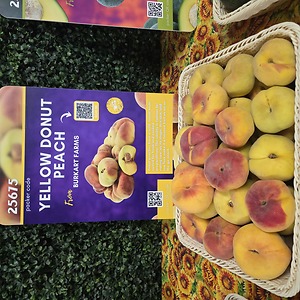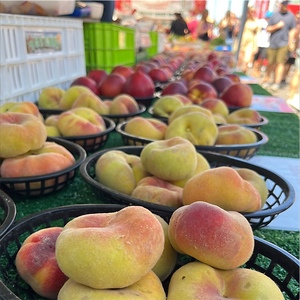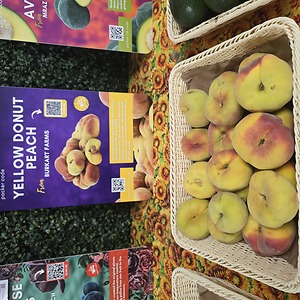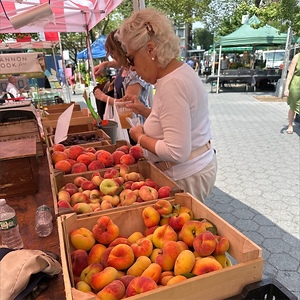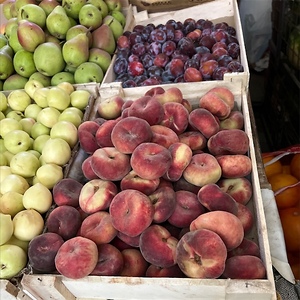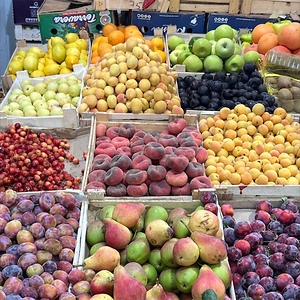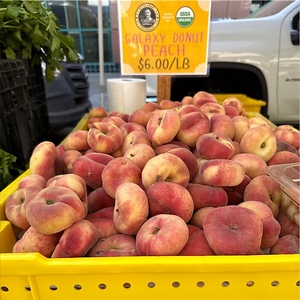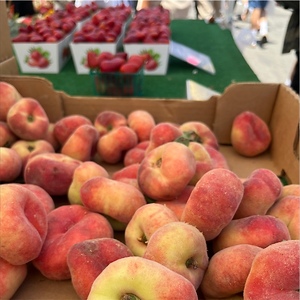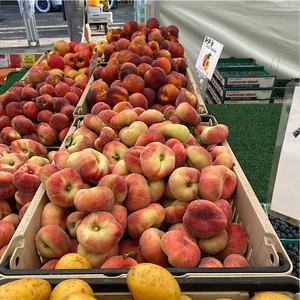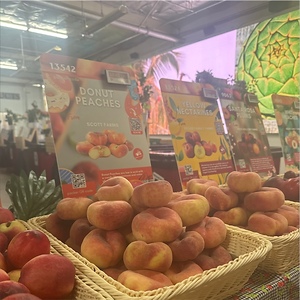

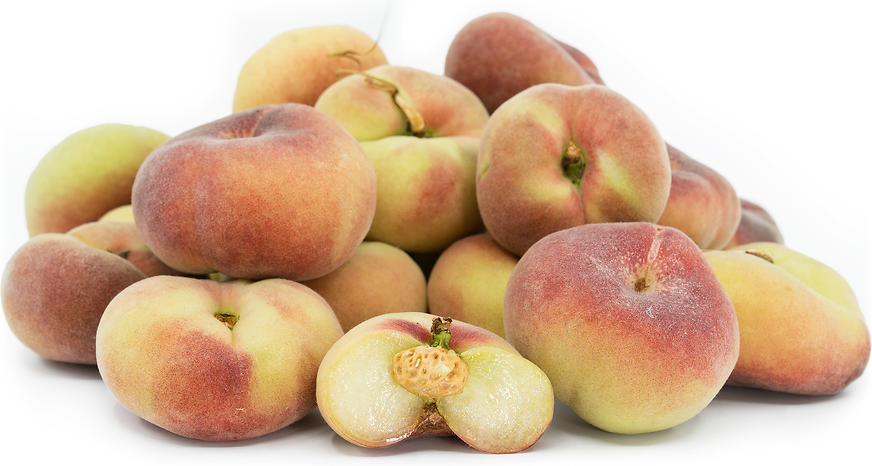
Donut Peaches
Estimated Inventory, 10 lbs : 0
Description/Taste
Donut peaches are small to medium-sized fruits, measuring 5 to 7 centimeters in diameter, and have an oblate shape with a flattened top and bottom and curved sides. Each fruit has a characteristic indent on the stem end and a prominent suture line extending down the peach’s side. Donut peaches have thin skins that can be easily punctured or damaged when the fruits are ripe. The skin is smooth and taut, covered in a light layer of velvety fuzz, and showcases a pale yellow-green base coloring blushed with dark red-orange patches. Underneath the surface, the white to ivory flesh is dense, aqueous, soft, and tender with a succulent consistency when ripe. The flesh also envelops an easy-to-remove central brown pit. Donut peaches emit an aromatic, sweet, floral scent with subtle rose-like nuances. The fruits are edible once ripe and have high sugar mixed with low acidity to create a candy-like sweetness with floral, fruity, and almond-like notes.
Seasons/Availability
Donut peaches are available in the late spring and summer, typically between mid-June and September in the Northern Hemisphere. Each growing region will have varying harvest dates within this range, which spans a few weeks.
Current Facts
Donut peaches, botanically classified as Prunus persica var. platycarpa, are a type of flat peach variety belonging to the Rosaceae family. The name Donut was given to a flat peach cultivar in 1986 by Frieda’s Specialty Produce in California. Donut peaches were one of the first trademarked flat peaches in the United States and acquired their moniker from the fruit’s similarity in shape to the doughnut baked good, especially when the central stone is popped out, leaving a hole in the center of the fruit. There are many varieties of flat peaches worldwide, and Donut peach is one of several cultivars sold in retail markets. Flat peaches can be freestone or clingstone types and appear in yellow and white-flesh varieties. Other popular varieties of flat peaches include Galaxy, UFO, Sauzee Swirls, TangOs, Sweet Bagels, Flat Wonderfuls, BuenOs, Peach Pies, and Saturn. Flat peach varieties are notoriously difficult to cultivate due to their susceptibility to blight, easily split skins, and varying ripening times. The fruits are only available for a short season each year and are sold at premium prices. Despite these challenging characteristics, Donuts and other flat peach types are favored for their distinct shape and sweet, low-acid flavor. The oblate fruits are a novelty in retail markets and are utilized in a wide array of fresh and cooked culinary preparations.
Nutritional Value
Donut peaches are a source of fiber to aid in digestion and potassium to balance fluid levels while replenishing electrolytes in the body. It is important to note that each variety of flat peach may vary in vitamin and mineral content. Peaches, in general, also provide minerals like iron, calcium, phosphorus, copper, magnesium, and manganese. Iron produces the protein hemoglobin for oxygen transport through the bloodstream, while calcium and phosphorus support bone and teeth health, Copper assists the body in making red blood cells, magnesium helps regulate daily nerve functions, and manganese contributes to connective tissue formation. Vitamins in peaches include vitamins A, C, E, and K to maintain healthy organs, strengthen the immune system, protect the cells against free radical damage, and aid in faster wound healing.
Applications
Donut peaches have a mild, sweet taste suited for fresh and cooked preparations. The variety is famous for eating raw, as its shape, thin skin, and low fuzz make it a favored fruit as an on-the-go snack. Some fruits have a central pit that can be easily removed, leaving a ring of flesh that can be eaten out of hand. Donut peaches can also be sliced and added to green salads and fruit medleys or served on cheese boards as a sweet addition. The variety can be utilized in almost any recipe calling for peaches, but it is worth noting that they have less acidity and should be used in dishes that require sweetness. Try adding Donut peaches to fresh salsa, ceviche, or parfaits, or use them as flavoring for homemade ice cream. The fruits can also be blended into smoothies, fruit juices, and purees for cocktails. In addition to raw preparations, Donut peaches add complexity to savory dishes and are often grilled, poached, or roasted with meat. They are also simmered into jellies, syrups, and compotes or incorporated into baked goods like cakes, pies, galettes, and cobblers. Donut peaches pair well with other fruits such as apricots, cherries, citrus, and berries, vanilla, cinnamon, cloves, herbs such as basil, cilantro, and arugula, hazelnuts, pistachios, aged cheeses such as parmesan, and mild cheeses such as ricotta and burrata. The variety should be ripened at room temperature, and once mature, the fruits should be eaten within four days. Ripe peaches can also be stored in the refrigerator for 1 to 2 days.
Ethnic/Cultural Info
In China, the name for flat peaches roughly translates to Pántáo, Peento, or Pan Tao, meaning “coiled, flat, or immortal” peach. The oblate-shaped fruits have grown in China since ancient times and are often included in cultural folklore. The most famous legend associated with Pántáo peaches is tied to the Taoist goddess Xiwangmu, known as the Queen Mother of the West. Chinese mythology states that Xiwangmu resides in the Kunlun Mountains, a mythical mountain range in western China. In the Kunlun Mountains, it is said that Xiwangmu has an orchard filled with over 3,600 peach trees. There are many variations of this story, but the tale is generally told that the peaches take over 3,000 years to mature, with some types taking over 9,000 years for the trees to grow, bear fruit, and ripen. When the fruits are ready to eat, legend has it that Xiwangmu hosts a banquet and invites select guests to consume the immortal peaches. One of the most famous versions of this story is found in The Journey to the West, a novel written by Wu Cheng’en in the 16th century. It is unknown what type of peaches are referred to in this story, but flat peaches are often associated with this tale due to their origins in China, sweet taste, and unusual shape.
Geography/History
Donut peaches are descendants of ancient flat peach varieties native to China. Flat peaches were first mentioned in Chinese writings found in the Qingyilu, a collection of essays compiled sometime during the 10th century BCE. Flat-shaped types were also recorded in the 12th century, and over time, the fruits were carried along trade routes for introduction in the rest of Asia, the Middle East, and Europe. In 1828, nurseryman William Prince imported flat peaches into North America. Varieties were also planted in 1859 in nurseries in Augusta, Georgia, by businessman Prosper J. Berckman. Later in 1890, Berckman’s Fruitland nursery catalog listed around eleven flat peach varieties. The initial varieties of flat peaches were challenging to cultivate and eventually declined in production due to their inability to adapt to American peach-growing regions. In the 1960s and 1970s, scientists Catherine Bailey, L. Fredric Hough, and Jerry Frecon began hybridizing flat peaches through Rutgers New Jersey Agricultural Experiment Station. A new variety named Saturn was developed with a larger size, sweeter taste, and hardier growth characteristics. Saturn peaches were released through Stark Bro’s nursery in Missouri in 1983, and the variety was protected under a patent until the early 21st century. Since Saturn’s release, new types of flat peaches have been bred worldwide and marketed under many different brand names. Today, flat peaches, including Donut peaches, are commercially grown worldwide and are sold as a specialty fruit in farmers' markets, select retailers, and wholesalers.
Recipe Ideas
Recipes that include Donut Peaches. One



